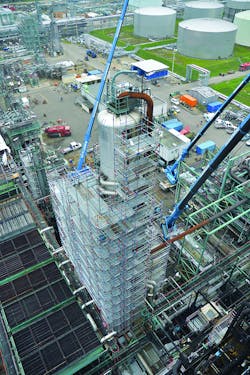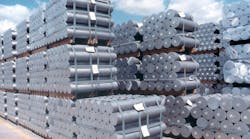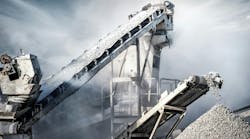Following a six-week turnaround and inspection that included extensive maintenance and servicing, OMV refinery in Burghausen — one important company in the southeast Bavarian "chemical triangle" known as the ChemDelta — restarted operations in November 2014.
The oil refinery has been continuously improved and expanded since 1967. Today it is owned by OMV Deutschland GmbH, a 100 percent subsidiary of Austria-based OMV Aktiengesellschaft.
In a phased sequence, other plants linked to the refinery were also restarted. For example, simultaneously with the shutdown at OMV, polyolefin production was shut down at the adjacent Borealis Polymere GmbH.
"As we operate our refinery in a network with other plants, the shutdown involves additional coordination efforts," says Martin Pipek, shutdown project manager. "Not only do we have to ensure coordination of all processes and activities, making sure they interact like clockwork; we also have to integrate all upstream, downstream and midstream plants into the process."
The project cost around 42 million euros and more than 600,000 working hours were expended. More than 4,000 employees were involved in the project at its peak, with zero accidents.
A puzzle in steel
A shutdown is like working with an immense steel jigsaw puzzle that must be broken down in detail prior to precise reassembly, all while under enormous time pressure and subject to maximum safety requirements.
Each individual plant "part" is labelled, cleaned, inspected, or if necessary, repaired or replaced. Shutdown intervals at Burghausen range between five and seven years, depending on whether special interim inspections, or substitute tests, take place. The legal framework of the procedure is outlined in the German Regulation on Industrial Safety and Health. Its revised edition became effective June 2015. TÜV SÜD Industrie Service supported the project in all issues related to safety and logistics.
Besides preventive maintenance, improvements were made that were not possible with the refinery in operation. Experts examined valves and other components while
equipment integrations were executed. To do so, the shutdown team stopped crude-oil delivery from the pipelines and cleaned the equipment with steam and nitrogen, removing all hydrocarbons.
Facility integration
The shutdown was like an immense steel jigsaw puzzle that must be broken down in detail prior to reassembly, while under enormous time pressure.
The refinery plays a central role in the supply of mineral oil products to Southern Germany. Every year it refines 3.8 million tons of crude oil, producing middle-distillate products such as kerosene, diesel and heating oil, and above all, petrochemical feedstocks — including ethylene, propylene and butadiene for plastics and tire industries.
During the shutdown, OMV installations were prepared for the integration of a new butadiene facility. The gas produced supplies input material in car tire production, a market independent of the fuel sector.
The ultrapure feedstocks used in special plastics are core refinery products. The facility has been describes as Europe’s first “meta-thesis” plant. The scientists who developed the method were awarded the Nobel Prize in Chemistry in 2005.
In thermal cracking, the refinery’s coker unit processes the distillation residues into lighter products. Green coke from the coker unit is then heated to 1,350 degrees C in the calciner and refined into calcined petrol coke. This solid material is used in aluminum and steel industries in production of electrodes.
Orchestrated processes
Organization is paramount during a shutdown involving disassembly of nine process furnaces, 50 columns, 271 tanks and vessels and 315 heat exchangers.
A separate work group monitored the roughly 500 blind gasket inserts of different sizes that can be used to isolate individual plant units and pressure equipment. Every blind gasket had its own numbered tag.
In portable cabins housing the shutdown project offices, meters of wall space were dedicated to overview. A missing tag showed the blind gasket was in use, installed in the refinery. Tags hanging on the wall indicated the blind gasket was removed and that this part of the plant was again ready for operation.
"The blind gasket is a typical symbol of a plant shutdown and its complex logistics," Pipek says.
OMV commissioned experts from TÜV SÜD Industrie Service to complement its in-house inspectors. Experts of the international service provider inspect installations, components and vessels inside and out, as required by the German Regulation on Industrial Safety and Health, and perform various pressure, tightness and strength tests.
"For this shutdown, we have complemented our local team of 10 experts by adding another 30 experts from our national network of branch offices," says Peter Kerscher, branch manager TÜV SÜD Industrie Service GmbH in Trostberg.
The team composed had experience in management, organization and logistics of large-scale processes.
Prior planning
The shutdown involved disassembly of nine process furnaces, 50 columns, 291 tanks and 315 heat exchangers. (Courtesy TUV SUD)
Responsible parties planned all tests and inspections (T&I) carried out down to the last detail. In the first two weeks of the shutdown, the TÜV SÜD experts carried out all statutory inside inspections – up to 60 inspections per day. For visual examinations the T&I professionals climbed into pressure equipment that first had to be released for inspection. In week three, experts carried out around 30 strength tests per day, verifying, for example, that the heat exchangers and their inside tube bundles remain leak-proof.
Pipek says, "Working with and coordinating an array of different partner companies is a special challenge. Around 95 percent of the specialists involved in the shutdown process come from external companies. This means that different approaches, including the execution and non-destructive testing of weld points, may have to be synchronized."
As noted, the refinery and the polymer installations went back into operation in November 2014. Following the completion of the statutory turnaround and inspection, TÜV SÜD Industrie Service issued the permit for continued operation and documented all inspections results in a detailed report.
"The fact that we completed the entire project without any major accidents is particularly important to me," says Dr. Gerhard Wagner, refinery manager and CEO, OMV Germany. Every turnaround and inspection of the refinery is also aimed at improving production. The most recent modernizations and extensions have excellently prepared us for our future in international competition."
Wagner says that while the installations boasted state-of-the-art technology, maximum availability and efficient energy utilization, it will be necessary to fine-tune and further improve the modified plant components integrated into the overall system.
The plant is planned to run without interruption in the coming years. However, Wagner says, "when one shutdown ends the next shutdown begins."
TÜV SÜD Industrie Service has supported the refinery since it began operations.
"We have known the plant and its special features for nearly 50 years," says Kerscher. "Working with its operator, we ensure the implementation of our shared safety philosophy."
Thomas Bauer is head of communications for OMV Germany.




